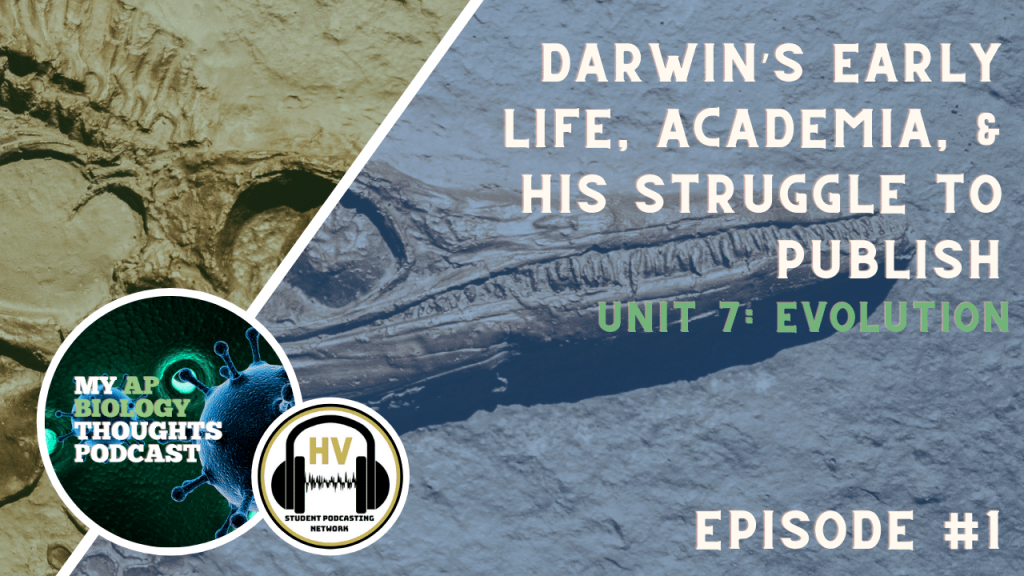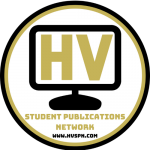Darwin’s Early Life

Welcome to My AP Biology Thoughts podcast, my name is Saarim and I am your host for episode #1 called Darwin’s Early Life. Today I will be discussing the early life, academia, and internal turmoil of English naturalist Charles Darwin, who is notable for his scientific theory of evolution by natural selection. We all know the name, Charles Darwin, and his idea that all living things developed and adapted overtime as a result of random mutations which gave these organisms traits suitable for their lifestyles. But how did he come up with this idea? The impacts of his theory are enormous as they really show us where all living things come from and the theory even created divisions in society amongst Darwinists/modernists and fundamentalists. But let’s go all the way back to explore the origins of this theory.
Segment 1: Introduction to Darwin’s Early Life And Academia
- Talking about Darwin in Academia, his experiences in school, transition from medicine to religion, to naturalism and voyage on HMS Beagle, observations from trip/significance, and internal struggle deciding to publish work
- Credit New England Complex System Institute and Eric Guise’s AP Biology videos for the following info
- Darwin Info
- Born in Shrewsbury, England; attended Shrewsbury School
- Interested in nature since young age – beetle collection
- Father wanted him to be doctor – went to Edinburg Medical School – found lectures boring and couldn’t stand watching surgeries done without pain killers (left med school after 2 years)
- Father arranged from him to be priest/clergyman – earned bachelor of arts degree from Cambridge; continued interest in nature
- Became friends with two professors at Cambridge – geologist and John Henslow (botanist)
- Around the world sailing trip on HMS Beagle being arranged by Royal Navy – John Henslow recommended Darwin as the trips naturalist
- Darwin left for a 5 year journey – wrote down all his observations, etc.
Segment 2: Example of Darwin’s Observation During His Journey
- Brazil
- Visited tropical rainforest: great diversity – began thinking about diversity of life and the creation of different species
- Observed animals eating and chasing each other – animals struggled to survive
- Argentina
- Observed how the grass where the cattle grazed smaller than grass that cattle had been introduced with – idea of something allowing different types of grass to survive
- Tierra del Fuego
- Saw how well suited native were to their harsh environments
https://www.cake.co/conversations/K2sNdvV/the-last-people-tierra-del-fuego-the-island-of-souls
- Chile
- Rocks in the south were higher above sea level than the same rocks in north
- Earthquake: rocks had been lifted and marine organisms hgh up and dry – changes in environments = changes in organisms
- Galapagos
- Studied 3 main species: finches, tortoises, and the marine iguanas
- Finches
- Saw a different type of finch species with different types of beaks on each island depending on the conditions of the specific island – finches with strong beaks that ate large nuts (to open them); finches with beaks designed for just cracking small nuts; finches that ate fruits and insects had different beaks
- Darwin developed idea that birds from one species separated to different islands and adapted to new environments
https://en.wikipedia.org/wiki/Darwin%27s_finches
- Tortoises
- Looked different – different neck sizes depending on the island – must have adapted to get food: long neck (higher vegetation); short neck (lower vegetation)
https://www.mun.ca/biology/scarr/4270_Galapagos_tortoises.html
- Marine iguanas
- Lizards ability to swim was unique – adapted to survive on scarce food on the islands
https://galapagosconservation.org.uk/wildlife/marine-iguana/
At this point, I will talk about his internal struggle he faced when deciding to publish his observations/theory
- Waited 23 years to present his research
- Fear over public’s reaction to the theory – very religious – believed that species were fixed and never different (evolution = heresy)
- Published his work after encouragement from fellow naturalist, Alfred Wallace
- Accepted by some, rejected by some
Segment 3: Digging Deeper Into Darwin’s Impact
https://www.scientificamerican.com/article/darwins-influence-on-modern-thought1/
- Darwin founded evolutionary biology – formulated idea of evolution by natural selection
- Darwin knew nothing about genetics or DNA structure – no knowledge on the mechanism of heredity (by filling in his possible gaps, we have deeper understanding of evolution)
- Four significant contributions to evolutionary biology
- Variations arise in species
- Branching evolution – common descent of all species from single common ancestor
- Evolution is gradual – no major discontinuities
- Mechanism of evolution is natural selection
- He has answered for us: where do we come from? (biggest breakthrough of life science)
Thank you for listening to this episode of My AP Biology Thoughts. For more student-ran podcasts, make sure that you visit www.hvspn.com. Thanks for listening!

